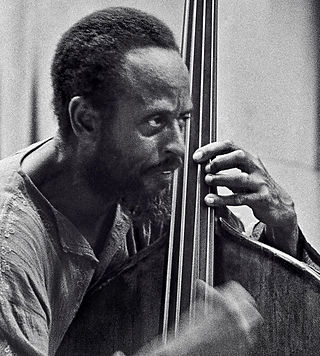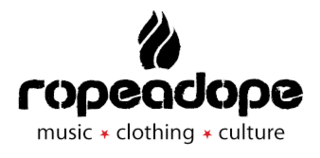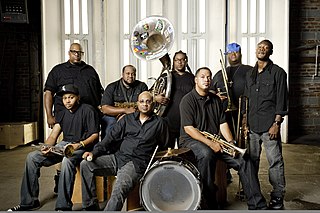
Percy Heath was an American jazz bassist, brother of saxophonist Jimmy Heath and drummer Albert Heath, with whom he formed the Heath Brothers in 1975. Heath played with the Modern Jazz Quartet throughout their long history and also worked with Miles Davis, Dizzy Gillespie, Charlie Parker, Wes Montgomery, Thelonious Monk and Lee Konitz.

Medeski Martin & Wood is an American jazz fusion band formed in 1991, consisting of John Medeski on keyboards, Billy Martin on drums, and Chris Wood on bass. The band is influenced by musical traditions including funk and hip hop and is known for an unconventional style sometimes described as "avant-groove".

The second line is a tradition in parades organized by Social Aid and Pleasure Clubs (SAPCs) with brass band parades in New Orleans, Louisiana, United States. The "main line" or "first line" is the main section of the parade, or the members of the SAPC with the parading permit as well as the brass band. The second line consists of people who follow the band to enjoy the music, dance, and engage in community. The second line's style of traditional dance, in which participants dance and walk along with the SAPCs in a free-form style with parasols and handkerchiefs, is called "second-lining". It is one of the most foundationally Black American–retentive cultures in the United States. It has been called "the quintessential New Orleans art form – a jazz funeral without a body". Another significant difference from jazz funerals is that second line parades lack the slow hymns and dirges played at funerals.
Galactic is an American funk band from New Orleans, Louisiana.

Kermit Ruffins is an American jazz trumpeter, singer, and composer from New Orleans. He has been influenced by Louis Armstrong and Louis Jordan and says that the highest note he can hit on trumpet is a high C. He often accompanies his songs with his own vocals. Most of his bands perform New Orleans jazz standards though he also composes many of his own pieces. Jon Pareles of The New York Times wrote, "Mr. Ruffins is an unabashed entertainer who plays trumpet with a bright, silvery tone, sings with off-the-cuff charm and never gets too abstruse in his material."

Anthony John Medeski is an American jazz keyboard player and composer. Medeski is a veteran of New York's 1990s avant-garde jazz scene and is known popularly as a member of Medeski Martin & Wood. He plays the acoustic piano and an eclectic array of keyboards, including the Hammond B3 organ, melodica, mellotron, clavinet, ARP String Ensemble, Wurlitzer electric piano, Moog Voyager Synthesizer, Wurlitzer 7300 Combo Organ, Vox Continental Baroque organ, and Yamaha CS-1 Synthesizer, among others. When playing acoustic piano, Medeski usually plays the Steinway piano and is listed as a Steinway Artist.

Steven Bernstein is an American trumpeter, slide trumpeter, arranger/composer and bandleader based in New York City. He is best known for his work in The Lounge Lizards, Sex Mob, Spanish Fly and the Millennial Territory Orchestra. Sex Mob's 2006 CD Sexotica was nominated for a Grammy.

Donald Harrison Jr. is an African-American jazz saxophonist and the Big Chief of The Congo Square Nation Afro-New Orleans Cultural Group from New Orleans, Louisiana.

The Rebirth Brass Band is a New Orleans brass band. The group was founded in 1983 by Phillip "Tuba Phil" Frazier, his brother Keith Frazier, Kermit Ruffins, and classmates from Joseph S. Clark Senior High School, which closed in the spring of 2018, in the Tremé neighborhood of New Orleans. Arhoolie released its first album in 1984.

The Fairview Baptist Church Marching Band, also known as the Fairview Baptist Church Brass Band, was the brainchild of Reverend Andrew Darby Jr., pastor of Fairview Baptist Church. The band was created in 1970 after Mr. Danny Barker became a member of Fairview Baptist Church. When Mr. Barker became a member, he asked Reverend Darby what he wanted him to do in the church. Reverend Darby asked him to enlist young people in the church and in the neighborhood who played instruments and work with them as an instrumental group (band). Reverend Darby told Mr. Barker that there was a critical need to produce young musicians to carry on the rich tradition of music in New Orleans in order to ‘replenish the stock’ as adult musicians grew older. Under the leadership of Pastor Darby, Mr. Barker agreed. Thus, the tradition, would live on and on.
The Hurricane Brass Band was a brass band from New Orleans, Louisiana. Established by Leroy Jones in 1974 when the Fairview Baptist Church Marching Band was disbanded, the group included Jones and Gregory Davis on trumpet, Darryl Adams on alto saxophone, and Anthony "Tuba Fats" Lacen on sousaphone. When Jones left the band to pursue a solo career, Adams took over as leader and renamed the group the Tornado Brass Band. Adams still serves as the leader of Tornado Brass Band. While some members of the band went on to form the Dirty Dozen Brass Band in 1977.

Daniel Moses Barker was an American jazz musician, vocalist, and author from New Orleans. He was a rhythm guitarist for Cab Calloway, Lucky Millinder and Benny Carter during the 1930s.

Ernest Harold "Benny" Bailey was an American jazz trumpeter.

Ropeadope Records is an American record label known for recordings in a variety of genres including jazz, hip hop, gospel, and electronic music. The label, now led by Louis Marks, was founded in 1999 by Andy Hurwitz in New York City and later moved to Philadelphia.

Sammie "Big Sam" Williams is an American trombonist and band leader from New Orleans, Louisiana. He has been a member of the Dirty Dozen Brass Band and leads Big Sam's Funky Nation.

Miles & Quincy: Live at Montreux is a collaborative live album by American jazz trumpeter Miles Davis and conductor Quincy Jones. It was recorded at the 1991 Montreux Jazz Festival and released by Warner Bros. Records in 1993.

Snarky Puppy is an American jazz fusion band led by bassist Michael League. Founded in 2004, Snarky Puppy combines a variety of jazz idioms, rock, world music, and funk and has won five Grammy Awards. Although the band has worked with vocalists, League described Snarky Puppy as "a pop band that improvises a lot, without vocals".

The Soul Rebels are an eight-piece New Orleans based brass ensemble that incorporate elements of soul, jazz, funk, hip-hop, rock and pop music within a contemporary brass band framework.

Voodoo is an album by the New Orleans brass band the Dirty Dozen Brass Band, released in 1989. It was the band's Columbia Records debut.


















